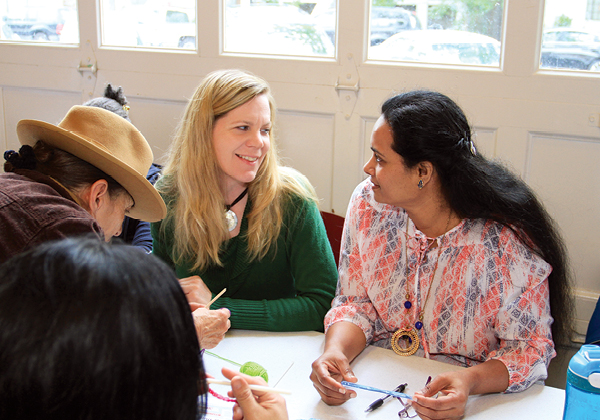
Connecting with community, restoring dignity for homeless women
On any given night, nearly 2,700 individuals experience homelessness in Sacramento County. An estimated 5,200 will become homeless over the course of a year. Those numbers from the 2015 Sacramento County and Incorporated Cities Homeless Count give officials a snapshot of the homeless condition.
But beyond the data, the basic hygienic needs of hundreds of women go unmet. A team of master’s-degree leadership students at the Betty Irene Moore School of Nursing at UC Davis shine light on the problem through coursework that also changes their perspectives on nursing.
“We partnered with Wellspring Women’s Center to identify a need and develop a solution. Guests at the nonprofit organization, many of whom are unsheltered, identified the lack of showers in our area,” says Kerri Maya, a nursing supervisor at Sutter Santa Rosa Regional Hospital. “This lack of access contributes to poor health outcomes, lack of self-esteem, decreased employment opportunities and likely isolation from the community.”
For their Community Connections course project, Maya and her classmate Mini George tackled the issue head on. The course aims to break students out of their comfort zones by partnering with a community agency with experienced personnel and an appropriate constituency, then using that knowledge they gain from their community mentor to settle on a system-level issue.
From researching the insufficiency of resources—a mere four showers reserved for homeless women—to identifying how other cities address the problem, the students bring awareness to the community about both the scarcity of facilities and gender inequality for hygiene resources in the greater Sacramento area.
“As nurses we have a protocol with our patients—assessment, diagnosis, intervention, implementation and evaluation,” says George, a nurse in the family birth center at Mercy San Juan Medical Center. “Here the community was our patient. They communicated their needs. Hygiene brings them self-esteem. If someone is denied that, they cannot empower themselves.”
Wellspring Women’s Center is a charitable organization in the Oak Park community that provides services to low-income and homeless women and children with the mission of hospitality with dignity and love. Guests of varying cultures, backgrounds, races and religions come for practical assistance combined with compassion and encouragement, so they can better navigate life’s challenges and create lives marked by dignity and self-respect, and thus contribute to a healthier community for all.
“The School of Nursing students tackled the hygiene issue from a broad perspective and took it on,” says Genelle Smith, social worker and Wellspring’s wellness program coordinator. “The research the students did is a huge asset for me, as I continue the work I’m doing not only to create awareness, but also to look at issues where we can find funds, where we can align and partner, where we can co-create a sense of how we can come together around this issue.”
One approach to the challenge the students discovered is LavaMae, a nonprofit organization based in San Francisco that converts old city buses into mobile showers. Since the launch of LavaMae in June 2014, volunteers have installed 14,000-plus showers and inspired replication of its hygiene services.
“This is not drop-in do goodism,” says Deborah Ward, clinical professor and co-creator of the course. “It’s particularly wonderful that Mini and Kerri, both nurses, came to a problem like hygiene. Others might shy away from that, but it’s a fundamental gift of deeply intelligent and heartfelt nurses to see this not as just a personal problem to be dealt with, but something the community can work toward to make assets available.”
Maya and George went a step beyond their classroom and fieldwork to illustrate the challenges for Sacramento Mayor Darrell Steinberg, who met with the students and Wellspring leaders in May.
“It’s interesting. I don’t think I would have ever thought of mobile shower services. “I think we need to follow up on this,” Steinberg says.
“Our project is the initial step in a long-range plan advocating for community partnerships and sponsorship to bring shower buses to those in need of hygiene access, with the goal of restoring both health and dignity,” Maya says.
George adds, “As a nurse, I will incorporate the knowledge I gained from this course that a heart-to-heart connection helps.”

